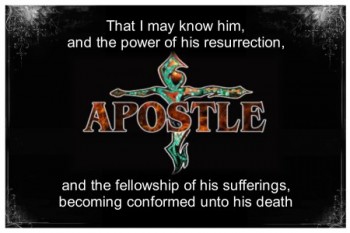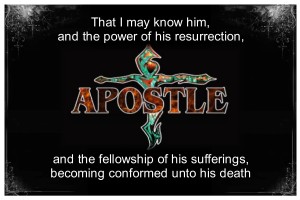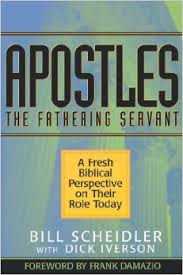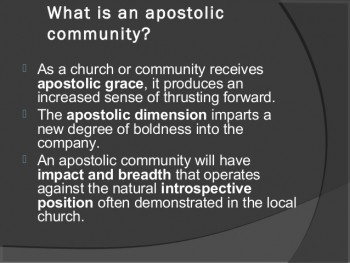
Journey to authenticity with Sonny Misar
Sonny Misar is a treasure trove of apostolic and pastoral wisdom. His teachings regarding “surrender” and “brokenness” deftly tie puzzling pieces of life together for believers.

Journey to authenticity with Sonny Misar
Sonny Misar is a treasure trove of apostolic and pastoral wisdom. His teachings regarding “surrender” and “brokenness” deftly tie puzzling pieces of life together for believers.

The Necessity of Converting Apostolic Ambitions
There’s a definite slippery slope when it comes to operating apostolically and/or prophetically. Along with any ascension gift comes the ability to influence and persuade people. With the apostolic and prophetic function there comes an inherent governmental nuance that is able to bring unprecedented impact into the life of a believer or community. However, if the potential to persuade is touched by carnal ambitions, it can wreak havoc in the lives of God’s People.
One of the sure signs of such apostolic carnality is that the ability to influence and persuade is used to direct people away from Christ and Christ being formed in them towards a “thing”, a new revelation, a mission, a project, an organization, etc. Essentially, rather than pointing believers to Christ, something is presented to believers as a lens that must be used in order to view Christ. It becomes THE THING and without it, a believer will “miss out” and “get left behind in what God is (really) doing.”
I’m pausing here because thinking about this and writing about this upsets me. I get angry. I get sad from having perpetrated such hijinks on precious believers in the past. It doesn’t matter that I was ignorant of it. I trusted my heart and went with what I thought God was speaking to me “to do”. My heart betrayed me! I was an orphan looking for significance. I had to “build” some thing in order to validate who I thought I was. My heart became broken. Since then, Father has been working at giving me a new one. Would to Father, other apostolic types would take heed and listen to what I am saying.
I am extremely thankful for a brothers/sisters who loved me, suffered with me long enough and were forgiving enough to see some maturity emerge in my life, character and calling. The Body of Christ is a beautiful thing!
In a previous post, A Basic Understanding of Apostolic Being, I offered the following statement:
A true, genuine, authentic, God-called and equipped apostle has to have converted ambition. Ambition is an earnest desire for some type of achievement or distinction. What is it that true apostles earnestly desire to achieve? What is the distinction they hope to obtain? Well, I can tell you that it isn’t to be known as God’s man of faith and power! It isn’t to lead a large congregation or organization. It is not desiring to plant/start churches or even to win the world for Jesus! (gasp!)
Would you like an example of what I am saying? Let’s just stick with apostles being THE THING, shall we?
One of the things which have been established as foundational principles in regards to the apostolic ministry is that apostles operate as wise-masterbuilers and are responsible for devising “apostolic strategies” to get this whole Kingdom thing d-o-n-e!
I REALLY wish apostolic brothers would STOP saying that……….especially about themselves!
I know Paul said it. He said it once.
And, he said it to a group of carnal believers in Corinth, who at the present time, were dominated by their evil nature, spiritually immature and unable to receive Paul’s spiritual teaching because they were not governed by the Holy Spirit. He fed them with milk rather than solid food because they were not able to assimilate the latter. (1 Cor.3:1-2)
He never used the “wise-masterbuilder” metaphor again to the Corinthians or in any other letter written to the churches. Nor, do you read anywhere in scripture where any other apostle does so.
Hmmmmm, I wonder why?
So, he is talking baby talk to infantile, carnal believers so they could potentially understand the point he was trying to make about himself and the other apostles mentioned in the chapter or that they knew. What was he trying to get across to them? Paul and Apollos are NOTHING but God is the Source that causes growth. And, in light of such basic truth, as believers they should stop being divided by choosing which apostolic brand they wanted to associate with in the faith.
But, brothers who want/need for apostles to be THE THING will use that verse as a proof text to establish that apostles are wise-masterbuilders, and, as such, should be honored, supported and heeded.
My question is, “Why aren’t all apostles heralded as laborious gardeners?” I’ve never heard an apostolic message on that one, especially in the Western world.
But before he lays down the wise-masterbuilder metaphor, Paul uses the gardening metaphor to illuminate his point. But, I reckon being identified as a sharecropper isn’t as glamorous to our unconverted ego as is being proclaimed a wise architect.
The truth of the matter is that Paul is referencing laying the foundation of Christ accurately in the life of believers so that they themselves can begin to build upon that foundation. Ultimately, the grace Paul received belonged to God and the People belonged to God. He isn’t talking about using his apostolic grace in building a ministry, organization, network or any of the other stuff our religious, idolatrous, unconverted ambitions can devise.
So, while a crucified-with-Christ Apostle Paul uses the wise-masterbuilder metaphor in context to attempt to remove himself from in between the believer and God and resolve the division found in community, today’s apostles, with unconverted ambition, erroneously embrace the moniker of wise-masterbuilder and prop themselves up before the people.
Converted ambition is what I’m talking about.
Below is an excerpt from T. Austin Sparks’ writing, An Apostle’s Supreme Ambition.
The impressive thing about this expressed ambition is the time at which it is made. Here is a man who has had a revelation and knowledge of Jesus Christ greater than any other man up to that time. That knowledge commenced whence as he said, “it pleased God to reveal his Son in me“. That beginning devastated him, and sent him into the desert to try to grasp its implications. Later he had been “caught up into the third heaven and shown unspeakable things, which (he said) were not lawful to be uttered”. Between, and around those two experiences, there is evidence of an ever growing knowledge of Christ. Here, after all that, near the end of his life, he is crying passionately: “That I may know him.”
The very least that we can say about this is that the Christ in view was a very great Christ indeed, who outstrips the greatest capacity and comprehension of man. This stands in such tremendous contrast to the limited Christ of our recognition and apprehension! How very much more there is in Christ than we have ever seen! But we must break down our verse. It is divided by its main words, and can be stated in its four phrases.
(1) The all-governing passion: “That I may know him.”
(2) The effectual power: “The power of his resurrection.”
(3) The essential basis: “The fellowship of his sufferings.”
(4) The progressive principle: “Conformed to his death.”
You can read the article in its entirety here. If you made it this far, you might want to go check it out. It is definitely worth your time.
When I talk to someone claiming to be an apostle, I use the 4 points provided above to gauge the conversation.
If the majority of the exchange is regarding their latest and greatest (insert something here), then I bless them and go about my way.
If I hear or can sense any mixture of the 4 points in our discourse, I know there is a potential connection to discover and develop. It’s Christ! It is ALWAYS Christ!
Keep your peace!
 I happen to be a firm believer in the apostolic and prophetic graces functioning in the Body of Christ today. As Ascension Gifts given to us by the Head of the Body, Christ Himself, I know their value to the People of God is irreplaceable and required for maturity to be developed in the believers, both individually and corporately.
I happen to be a firm believer in the apostolic and prophetic graces functioning in the Body of Christ today. As Ascension Gifts given to us by the Head of the Body, Christ Himself, I know their value to the People of God is irreplaceable and required for maturity to be developed in the believers, both individually and corporately.
In full disclosure, I haven’t always subscribed to apostolic and prophetic function. Beyond NOT KNOWING what they were, I was taught and trained that the apostle and prophet were simply titular offices that ceased with the death of Peter, Paul and the other brothers way back in the day. There was no need for God to “work or speak outside of sola scriptura now” since we have the Bible.
Let’s tap the brakes here. I am not wanting to turn this post into a discussion of the grand old debate regarding Scripture Only and whether or not apostles and prophets exist today and are relevant to the life of current day believers. I’ve circled around that mountain far too many times along the way in my faith journey and such discussions have rarely proven fruitful in cultivating things that truly matter, such as love and mutual respect. So, if you want to bail on this post now, I would encourage you to do so. No hard feelings on my part!
I have discovered over the years (and yes, innumerable debates, arguments and conversations) that people usually fall in three categories regarding the topic of apostolic and prophetic function. First, there is the “No way, Jose” crowd. Second, “Yes, they exist so we are going to make it THE thing now!” crowd. And, finally, those who being led by the Holy Spirit to consider, look into and explore such things and are open to them operating should they actually exist.
Having been indoctrinated into the first group of naysayers as I set out on my ministerial journey years ago, through time and experience, I wholeheartedly plunged full bore into the other extreme of apostolic/prophetic EVERYTHING where the restoration of the apostle and prophet was THE KEY to the closing out this age. With such a mindset, the structures, organizations and schemes to “DO THIS THING” emerge and, rather than equipping believers to function, the apostolic everything serves only to hold believers captive.
Regardless of who is at the top of the hierarchical system, a pastor or an apostle, the fact remains that the order is an inaccurate biblical and Kingdom representation fabricated by men’s whims, ambitions and imaginations and, therefore, cannot/will not bring about Father’s purpose for and in His family. While both functions of Christ’s Grace are absolutely required and have their role to play respectively, Pastors are not to be preeminent and Apostles are not to be the central, necessary component.
Over the past 15 years or so as I have merged back into the median of the two extremes, I have been blessed by the impact of Christ’s apostolic and prophetic graces functioning and being administered in a balanced and healthy manner.
As a matter of fact, I credit Christ making significant changes and bringing unforeseen growth in my life and character via the apostolic and prophetic graces over the past several years. The administration of those graces has, indeed, come through graced individuals but, more importantly in my opinion, has been administered through a corporate body and community (local and global) who have been equipped by those graces and released to operate accordingly. More about that in a later post.
While authentic apostolic/prophetic function can serve as a catalyst to believer’s growth and maturity, much harm can come to believers and their maturation can be thwarted by inaccurate apostolic/prophetic figures who consider the respective grace in which they function to be THEIR OWN. The key to effectiveness in authentic apostolic and prophetic graces are that they function accurately and according to Father’s intent and Christ’s grace……..not according to men’s intentions, interpretations and men’s design. Although the ego induced shenanigans of ME and MY ANOINTING thrive within the parameters of men’s configured religious settings, such carnality has NO PLACE in the Kingdom and Father’s Economy.
When Jesus said, “I will build (MY) Church (of ME)….”, my opinion is that he really, really meant it. It is His Grace – whether apostle, prophet, pastor, teacher and/or evangelist – that functions through a DEAD to SELF, yielded vessel, who, as the Apostle Paul stated, ” I am crucified with Christ, nevertheless I live, yet not I, but Christ lives in me.”
(To be continued in a subsequent post)
What is the Role of Apostles in Current Culture?

Role of Apostles in Current Culture
The Church is the pillar and support of the truth in society. If the church compromises, culture degenerates, which describes the current state of crisis in the Western World. When the church stands strong, culture is positively affected.
Apostles and prophets are the foundation of the church, not only historically, but in every generation. The living Christ Jesus serves as Chief Cornerstone of the foundation of the church; apostles and prophets function as human leaders of the church in every age.
Essentially, as apostles lead, so goes the church. And as is the church goes, so goes society. The role of apostles is pivotal for our day. To understand more about apostolic ministry, come to Local Churches Global Apostles.
Let’s apply these concepts to modern day society and the current marriage crisis in view of the Supreme Court decision.
Human marriage is a graphic illustration of the mysterious union of Christ (the Bridegroom) and His church (the bride). When anyone looks at a Christian marriage, he should sense Christ’s love for His people. He should also glimpse the wife’s respect for her husband that leads to the same kind of obedience that is the hallmark of the church’s relationship with Christ Jesus.
Wow! Do people see that in my own marriage? Probably not. No one yet that I know of has seen my marriage, fallen on his knees, and converted his life to Christ! But at the least, he should marvel and admire the dynamic that builds a long and happy marriage relationship.
What does the Bible say about homosexual behavior? First, let’s note “For God did not send the Son into the world to judge the world, but that the world should be saved through him” (John 3:17).
When I speak about homosexual behavior, I speak with grief and love, My wife and I invited a lesbian in need into our home. During her two month stay with us we cared for her, prayed with her, and gave her Christian love and nurture. At the end, she was freed from nearly twenty years of homosexual bondage and has continued in righteous living to this day. Do we hate homosexuals? No, and we have the goods to prove it.
Romans 1:18-32 speaks with clarity. I quote only one sentence from that section. “And just as they did not see fit to knowledge God any longer, God gave them over to a depraved mind, to do those things which are not proper . . . ” Romans 1:28).
Then again we find “Just as Sodom and Gomorrah and the cities around them, since they in the same way as these engaged in gross immorality and went after strange flesh, are exhibited as an example, in undergoing the punishment of eternal fire” (Jude 7).
Multiphasic, of course. Still, a critical role of apostles is to strengthen marriages. All leaders, especially apostles and prophets, need to have their own great marriage and lead the churches with whom they have a relationship to develop beautiful marriages. The role of apostles is to equip church members to be salt and light in their communities and nowhere is this more needed than in the matter of marriage. For some, though not everyone, the role of apostles is to lead deliverance ministries to see people with unwanted same sex attraction liberated.
The role of apostles and prophets is high and necessary. Thankfully, God gives grace to fulfill the demands of the office.
In one sense, the rise of a righteous society depends on the role of apostles. So we cry, “Rise up, O men of God!” and “Apostles, come forth!”

Should Modern Day Apostles Use the Title “Apostle?”
Should modern day apostles use the title “apostle?” (Note: The graphic to the left is attributed to apostolic-community-living)
The question is controversial. Some genuine modern day apostles use it, others refuse it. Some think the title apostle should never be applied to 21st century ministers, others bandy it about as commonplace. Let’s attempt some clarity in the matter.
First off, we can all agree that function supersedes title. We’ve all seen the danger and disgrace when someone assumes a title or position when he has nothing to back it up. We’ve also seen the beauty and humility of one who functions in a capacity, yet eschews the honors that could go with it.
Should modern day apostles use the title “apostle?” Let’s look at the pros and cons of both sides of the question.
Anyone who claims or accepts the title of apostle will be be subject to higher expectations. Pastor James (who performed the role of an apostle but never adopted the title for himself) warns, “Let not many of you become teachers, my brethren, knowing that as such we shall incur a stricter judgment (James 3:1). If the warning holds for teachers, how much more for apostles!
Here’s another drawback. Anyone who claims the title of apostle today will be tossed into controversy. Some well-meaning and knowledgeable people don’t even believe in modern day apostles! Saint Paul was forced to spend unusual amounts of time defending his claim to be an apostle.
A third “con” is perhaps most important. No one should use the title of apostle until he’s proven in that ministry. If God has in fact called a minister as an apostle, he may well use the concept in prayer to God, but woe to the man who uses the title before his time.
Use of the term is Biblical and common occurring about 85 times in the New Testament. No one can deny St Paul used the term prolifically and applied it to himself.
Another Pro. Use of the title can help define a man and his role in the church. Napoleon said, “A man becomes the clothes he wears,” and dressed his army well. Think of the New York Yankees dressed in pinstripes. They defined themselves as “elite” and went out to win pennants. In much the same way, a minister needs to see himself doing what he’s called to do.
A title can (if used rightly) help others to relate to a minister in his God-anointed gifting. For example, a man who functions as an evangelist and wears the tile appropriately may receive more open doors to minister. He doesn’t need to hide his gifts and calling. For some apostles, it may be similar.
Obviously, there’s more to the question. Come to Local Churches Global Apostles for eye-opening insights many scholars have overlooked. What do you think? Should modern day apostles use the title “apostle?”
Use the comment box to weigh in.

J Lee Grady Signs of True Apostle
What are the signs of true apostle? J. Lee Grady is the former editor of Charisma and the director of the Mordecai Project (themordecaiproject.org). You can follow him on Twitter at @leegrady. He is the author of The Holy Spirit Is Not for Sale and other books.
A few years ago I heard a preacher tell a room full of ministers that they couldn’t work miracles or exercise apostolic authority unless they used the word apostle as a title. So some of them ran out and printed new business cards—as if putting the word in front of their names was the magic ticket to reclaiming New Testament power.
That was a bad idea. For the past 15 years or more, thousands of people have been wounded and countless churches have nosedived because immature leaders thought they could gain apostolic status the easy way. We are so eager to qualify ourselves that we forget God alone calls, prepares and sends true apostles.
The late Arthur Katz, who was a prophetic voice to our movement for many years, wrote in his 1999 book Apostolic Foundations that nobody should be eager to step into an apostolic assignment or to treat such a task flippantly. “God is jealous over the word apostolic,” Katz wrote. “It is a word that has fallen into disuse and needs to be restored, and that restoration is not going to be cheap.”
We are so carnal, so power hungry and so enamored with status and position that we don’t have a clue what apostolic ministry really is. Most charismatics think it is about authority, and many men who claim to be apostles build top-down pyramid structures that abuse people. Others think apostolic leaders are marked primarily by sensational miracles. Yet I see something we have entirely missed when I look at the life of the apostle Paul.
Paul told the Thessalonians that love is the true hallmark of any person who is sent on an apostolic mission. Therefore, if we want apostolic power or authority (which we should), it must flow through apostolic love or it is a counterfeit. This apostolic love can be described in four ways:
1. It is incarnational. Paul brought the gospel to the Thessalonians and lived among them. He did not just drop in, preach a good sermon and leave. He said, “We were well-pleased to impart to you not only the gospel of God but also our own lives” (1 Thess. 2:8, NASB, emphasis added). Just as Jesus came to this earth, lived among us and died for us, true apostles give it all. If all an “apostle” does is preach a good message, he is a poor substitute for the real thing. (And if he also spends more time taking up offerings for himself, he is a hireling or a con artist.)
2. It is sacrificial. Paul risked his neck in Thessalonica, and then he told his followers that he would “suffer affliction” from his persecutors (1 Thess. 3:4). But he loved them so much that he prayed for them continually, and he longed to visit them again even though he knew it would be risky. He never mentions money. In fact, when he was with the Thessalonian church, he worked night and day “so as not to be a burden to any of [them]” (1 Thess. 2:9). That flies in the face of modern apostles who charge $1,000 an hour for their consulting fees.
3. It is relational. The word brethren appears in 1 Thessalonians 17 times. That’s because Paul viewed the church as the family of God. He saw himself in the role of a gentle, nursing mother (1 Thess. 2:7) as well as a strong father (v. 11). Paul’s affection is so thick and so slobbery that it drips off the page of his letter. He says the members of the church “have become very dear” to them (v. 8) and that they “also long to see [them]” (3:6). It’s no surprise that he ends the epistle by exhorting the people to greet one another with “a holy kiss” (5:26).
What has happened to this kind of holy affection in today’s church? Why are we so disconnected? We have replaced deep relationships with cold professionalism. Many pastors have not been properly fathered, so they don’t know how to love—nor do they have close friends. So we cover our dysfunction with busyness. We work, work, work—while sterile, loveless congregations struggle to grow. We use gimmicks and programs to get people in seats because our love is not warm enough to attract people to Jesus.
4. It is confrontational. Paul was not seeker-sensitive. He did not hesitate to confront sin. He gave the Thessalonians one of the most frank, forthright sermons on sexual sin ever written (1 Thess. 4:1-8). But he confronted them as a loving father by emploring them to stay within their God-given boundaries. He didn’t use anger, manipulation, domination or threats. He led with strong, apostolic love.
I believe God wants to pour out a new wave of apostolic power on our generation. But we can’t be trusted with this anointing if we refuse to grow up. We will have the maturity to use the word apostolic when we learn to walk in the love that was modeled by the first apostles.




Choicest greetings in the name of the Lord Jesus Christ. God has been so wonderful to me. He really proved what He promised in the month of January 2015.
I went to Philadelphia on January 8, 2015 to speak to a couple that needed counseling & prayer. We had great worship. I shared the word that God put on my heart.
There came one Hindu couple. This man by the name of Om Sharma was Hindu from India. He married to one white American lady who accepted Hinduism because of her husband.
That was so great. God also healed some other people. Physical healing is wonderful, but remember. “Salvation–greatest miracle of all.” This was really a great work of the Holy Ghost.

House Churches Are They Legit?
Could they be an alternative structure to traditional churches?
Things happened at houses in the early church:
Low cost. Just pay the mortgage.
Fellowship. The sharing of lives in a home atmosphere.
Evangelism. More natural to invite someone to a home.
Discipleship. The structure of the house church makes application of truth a more lively potential, where the fellowship hopefully creates interdependence.
Leadership. There’s a shortage of seminary-trained pastors. House churches look for a mature leader, an elder in the faith. They can also answer to the clergy-laity gap.
New Testament model. Church buildings multiplied when Christianity became a state-recognized religion. Under persecution in the first two centuries, the house church model flourished.
History. The success of house churches in places like China and Africa is compelling. Revival and awakening have often been accompanied by a house church movement. Think Wesleyans, Moravians and Mennonites.
The success of the house church movement has brought it into the limelight. It is gathering momentum, and the wind of the Spirit is blowing. We would do well at least to understand it. Could be quite a homecoming!
Paul Anderson is an author, pastor, teacher, and highly regarded apostle of the Lord Jesus Christ. AS the former Director of Lutheran Renewal Services, he has shepherded thousands into the Spirit-led life. He and his wife Karen are blessed with six children and reside in Roseville, Minnesota. Latch onto his Godly wisdom at PastorPaulAnderson.com

Expansion 2015
Dear Friend,
We’re excited to announce our new Leadership Conference, called EXPANSION 2015! Instead of using our church as the venue as we have in the past, we’re going on the road for EXPANSION 2015. These will be powerful 2-day conferences filled with concentrated teaching sessions, worship and prayer—all toward the goal of enlarging Christ’s Kingdom through the ministry of your local church. And we’re stepping out in faith to do something we’ve always dreamed of—the conference will be absolutely FREE of charge for every attendee (except for a $20 registration fee)! On top of that, those attending will receive a copy of my new book STORM along with the Brooklyn Tabernacle Choir’s new worship project, plus other helpful items.
Our special musical guests at EXPANSION 2015 will be the Brooklyn Tabernacle Singers, who will serve also as worship leaders. EXPANSION 2015 is for every Christian pastor and their spouse, associate pastors, worship leaders and other church leadership. We are praying that this Conference will result in an explosion of effective evangelism/growth beyond what we can ask or think.
Pastors Tim Dilena, Michael Durso and others will join me as we look forward to ministering God’s Word to you. Our entire pastoral staff will be present to serve you in every way possible.
Sincerely,
Pastor Jim Cymbala
Dates and information for the Chicago and Baton Rouge, LA venues can be found at http://www.brooklyntabernacle.org/expansion2015
In the early 1970s Pastor Cymbala took over the leadership of the small, struggling Brooklyn Tabernacle in downtown Brooklyn. Today Pastor Cymbala oversees a congregation of several thousand people. The Lord has blessed Pastor Cymbala and Carol with three children and six grandchildren, including the most recent addition, little Levi, who was adopted from Ethiopia. A more complete account of the early years of The Brooklyn Tabernacle is included in Pastor Cymbala’s book Fresh Wind, Fresh Fire. Other books written by Pastor Cymbala include Fresh Faith; Fresh Power; Breakthrough Prayer; The Life God Blesses; The Church God Blesses; and The Promise of God’s Power.
Editors’s note: Let’s think large. Global Church Planting Sunday can aid world wide evangelism. We can be a part. 

Global Church Planting Sunday
The Need
Did you know there are hundreds of millions of people who do not have a Christian church within reasonable traveling distance of their homes? There are thousands of unreached people groups who do not have a Bible or a single local church. Since 1970, the number of Christians worldwide has increased by one billion, an increase of 83 percent. Yet the number of new churches has increased by only 19 percent. Without a church, new Christians do not have a good way to fully experience new life in Christ, and many will drift away from God.
What is Global Church Planting Sunday?
Global Church Planting Sunday is a special service on the second Sunday in February every year, when churches around the world come together to celebrate and to focus on planting more churches. In 2015, Global Church Planting Sunday will take place on February 8. All churches can participate, regardless of size, denomination, or location, and all of the necessary materials are available for download, free of charge.

Can my church really make a difference?
Every church can be involved in the planting of new churches. Acts 2 tells us about the effectiveness of the first new church started in Jerusalem. The Apostle Paul planted churches throughout the Book of Acts. The starting of new churches is the biblical method of fulfilling the Great Commission. It does not matter how big your church is or where you are located. By praying, increasing awareness, raising financial support, and casting a vision for fulfilling the Great Commission, you and your church can make a difference! Here are some of the ways you can be involved:
 How can my church get involved?
How can my church get involved?
It is easy for churches to get involved in Global Church Planting Sunday. A special downloadable kit has been produced to give your church everything you will need for this special Sunday. The free kit includes the following:
– See more at: http://churchplantingsunday.com/about#sthash.VFoNMVoa.dpuf
Copyright © 2025 B Mark Anderson · Site Admin